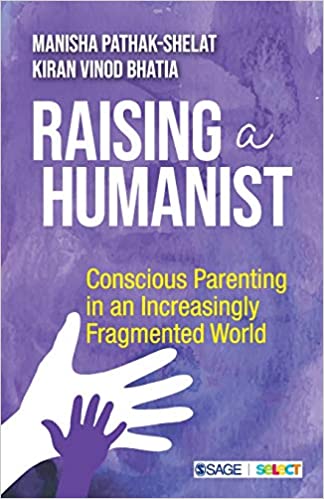As parents grapple with the complexities of the modern world that their children inhabit, the role of ‘conscious parenting’ could help in building a progressive society – more so in the pandemic/post-pandemic world. To that end, Manisha Pathak-Shelat and Kiran Vinod Bhatia’s recently-published Raising a Humanist paves the way to improve the style and pedagogy of parent-child engagement without passing any moral judgments on the intricacies of the relationship.
The book begins with a gentle reminder:
“The term ‘parent’ or ‘teacher’ is a verb and not a noun. It isn’t merely who we are. It is a process that we continuously engage in and work on.”
It asks an unusual and vital question: How can one unlearn and re-learn parenting roles in an increasingly fragmented world? The book also interrogates preconceived notions about popular culture and the role of media in constructing identities.

‘Raising a Humanist’
Manisha Pathak-Shelat and Kiran Vinod Bhatia
SAGE (2021)
India is a deeply casteist and feudal society. With generations that have been groomed into a particular way of thinking, it is important to understand how the undoing of social biases – questioning religious practices and social norms – can bring significant change. It is quite possible, as the authors suggest, to redesign a social environment that is bias-free, with the help of a pragmatic, comprehensive four-step approach: re-examining the process of socialisation, understanding privilege, embracing the power of ‘why’ (question), and challenging a single story.
Over time, children inherit biases and cultivate an opinion, knowingly or unknowingly, through the process of socialisation: individuals, with others, and within the community. While institutions like family and the school can help in the positive behaviour change, media – and its products – play the most crucial role in shaping the young mindset with undemocratic values and one-sided, manipulated narratives of different communities. And with that, there is a disposition of prejudice at heart, backed by stereotypes and confinements of the public discourse at large.
The book not only lays out the social divide – in terms of religion, caste, class, gender, and sex – prevalent in our society, but also addresses the concerns in a multi-faceted reality. With the help of insightful case studies and real-life examples, it amplifies the idea of postmodernism substantiating the intersectionality of identities and strives for an accommodative space while examining mental cocoons: echo chambers, silos and thought ghettos.
Also read: Parenting in India: Emotional Manipulation, Guilt Over the Marriage Question Mark
In a familial sense, the authors desire co-existence and a more tolerant society. At its core, the book inspects the Indian philosophy of Sahridaya – oneness of the heart; a conversational approach to bridge the gaps between different communities – and how with the usage of mindful, empathetic language we can build a compassionate society. “Actively thinking about outcomes may lead us to choose words that unite rather than divide us,” as the book puts it.
And at a time when the idea of cancel culture and unprecedented public slander are gaining momentum, the proposed ideas ought to travel across the mentioned specifics and must be taken on new urgency and relevance. It re-instils the notion of initiating conversations and discussions: a disposition of care, comforting tone, and operation of sensitive content.
In an age of ‘new childhood’ where technology lies at the centre of all kinds of learning and structural teaching methodologies, parents need to understand that internet is indispensable when it comes to education. The book, therefore, suggests a “judicious use” of gadgets to expand horizons of knowledge, creating global citizenship that transcends geographical and cultural barriers, and at the same time, is rooted in the local realities; encouraging socially-engaged art practices that are imaginative, change-oriented and participatory – on and off screen.
The structure of parenting requires re-orienting, more so in a digitised world. The bestowed freedom for its use, of course, ought to be backed by responsibility and transparency, directing parents to keep a close eye on the child’s activity.
It is, indeed, high time to reflect on the impact of parenting on the ideal of fraternity in India. The delusion when it comes to rigidity, glorification of certain identities, and contempt of engagements from ‘others’ has devolved into a toxic determination that has ripped off sensitivity and sensibility.
Kalrav Joshi is a recent graduate student of Journalism and Mass Communication and is fervently interested in politics, culture, development and art.
Featured image credit: Pariplab Chakraborty

